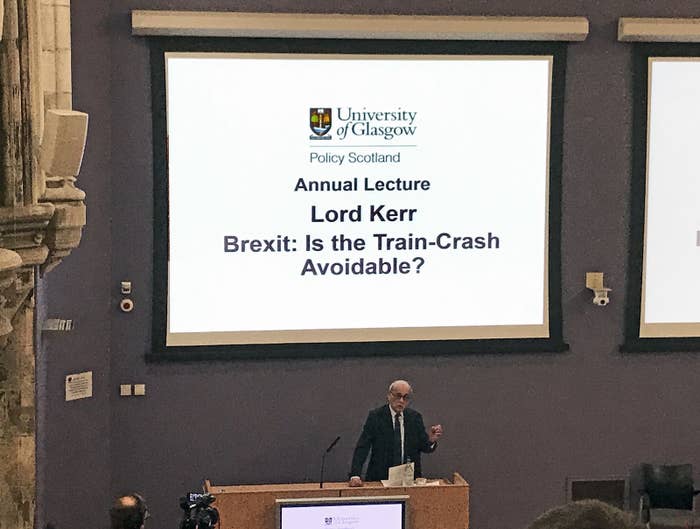
Lord Kerr, the man who drafted the legal process for member states to leave the EU, believes there is a chance the UK may end up not going through with Brexit if it becomes clear the economy would be severely damaged.
Kerr, the former UK ambassador to the EU who drafted Article 50 of the Lisbon Treaty, has laid out what he believes are the six possible outcomes of the Brexit negotiations, including a "1 in 3" chance Britain will leave the EU in 2019 having reached no deal with the other 27 members.
Kerr's lecture came a day after Theresa May's announcement that the UK will be leaving the single market, in which she said having no deal with the EU would be "better than a bad deal".

At a Policy Scotland lecture at the University of Glasgow on Wednesday evening, Kerr predicted a "decade of delay" on Brexit whatever the outcome of negotiations, warning the UK may not become a fully independent trading nation for 10 years.
Kerr also predicted there will be no "serious negotiations" between the UK and the other members until autumn this year at the earliest, and said discussions will start with a "furious battle" about money that could risk derailing the entire process.

Kerr said it was "perfectly possible" that Theresa May – or a subsequent prime minister – could choose to revoke Article 50 if "we were beginning to suffer a degree of economic damage" by the end of 2018.
He said there was also around a 10% chance that panic over the Brexit vote and other populist movements in France and the Netherlands could encourage the EU into becoming more flexible about reform, which could persuade the UK to stay.
"[One scenario] is that Europe has changed by 2019," said Kerr. "Maybe President Le Pen is demanding a new European model, maybe Brussels is in full retreat, then we could declare victory and stay – but the probability of that is very, very low."
The crossbench peer said the two-year Article 50 deadline could be extended should both the UK and the EU agree to it. This outcome is likely, he said, should the European parliament reject the deal at the end of negotiations.
"If all parties agree to extend the deadline, then the two-year deadline can be extended," said Kerr. "It could happen, for example, if the European parliament doesn’t like the look of the emerging agreement, the council might think it wise to wait for the new parliament to rise in autumn 2019.
"Or the parliament might vote it down, in which case I’m confident there would be an extension to wait for the new parliament."
Kerr said there was around a 25% chance of either the UK agreeing a good deal and a "substantive framework" for trade with the other members, or a deal with a "thin framework" that would give less certainty about the future of trade between the UK and remaining EU bloc.

However, he said the most likely scenario was that there would be no deal reached between the UK and the EU, which would throw the UK into "legal chaos" and a sustained period of economic downturn.
"If no deal is made, it's off to court with all these legal texts, and [there will be] a dispute about which court," said Kerr. "We'll leave anyway, as Article 50 says, if there is no deal the departing country departs.
"So out we go into serious economic disruption and degree of legal chaos and there will be serious problems for business. The probability of that is maybe about 25% or maybe more – I think there may actually be a 1 in 3 chance of no deal.”
Concluding his lecture, Kerr said that regardless of which of the six outcomes emerges from the end of Brexit negotiations, the UK faces a "decade of delay" as it attempts to strike trade deals with other countries and become a truly independent trading nation.
The EU will be "only the first of a long series of negotiations" that face the UK, he said, reminding the audience that the EU has 63 individual trading agreements with other countries that the UK will have to strike deals with individually.
"We can expect, I'm afraid, a decade of delay and disruption," he said, "with investment, economic growth, and employment lower than they would have been."
